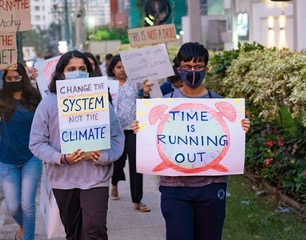
As one of the leading youth groups formed within YOUNGO to advocate for climate change action and health, we want to stress why it is crucial to encourage meaningful youth participation in facilitating a green post-COVID-19 recovery.
By Rodrigo Sánchez Iturregui (@roditurregui) and Deena Mariyam (@DeenaMariyam), YOUNGO Health Working Group External Affairs Co-Leads
YOUNGO (Youth + NGO) is the Youth Constituency of the United Nations’ Climate panel (UNFCCC) and runs various working groups focusing each on specific aspects of climate change negotiations within the UNFCCC to ensure that the perspectives of youth are heard in earnest. It consists of many youth-led organizations, groups, delegations, and individuals. After two years operating under provisional status, “YOUNGO” became fully recognized at COP17 in Durban, South Africa and has since served as both the official conduit for youth participation in the UN climate talks, and as a global network of youth and youth-focused organizations working on climate change. In addition, YOUNGO members observe and report on climate negotiations and the implications of their outcomes.
Over the past two years, the pandemic has catalysed public attention, including youth, who have undoubtedly become drivers of change in their communities. There are still major accountability measures that governments must adopt, however, to meaningfully involve youth in major decision-making processes.
Youth engagement as frontline community health workers, online activists, and mental health advocates has facilitated the path toward an accelerated recovery for many countries. For instance, Bangladeshi and Rohingya youths have been working around the clock to prevent COVID-19 infections in Cox’s Bazar. In Peru, medical students have been actively collaborating with the country’s Ministry of Health to facilitate various online spaces, starting in February 2021, in order to increase the engagement of young adults in health promotion measures – including mental health.
The experiences of the past year reinforce the potential of youth demands and activism. This work should not be overlooked, but rather placed at the forefront of discussions leading up to UNFCCC Intersessionals and G20 preparations, with concrete actions taken at COP26.
Climate change and the pandemic
Human health and planetary health are interwoven, a fact that has been gaining a lot of traction in the past months since The Lancet declared climate change as the greatest global health threat of the 21st century. (1) A recent study has shed light on the importance of this correlation, such as the shift in global bat diversity due to climate change as implicated in the zoonotic emergence of SARS-CoV-1 and SARS-CoV-2, both of which have caused large-scale epidemics. (2)
Climate variability affects human health via indirect pathways, particularly via changes in biological and ecological processes that influence infectious disease transmission and food yields.
Youth demands
Pressure by medical students led the University of Massachusetts to divest from fossil fuels in May 2016, the first major public university system to do so. With the support of recognized institutions such as the Association for Medical Education in Europe (AMEE), youth also participated in shaping a consensus on the importance of promoting education for sustainable healthcare, resulting in health personnel better prepared to address direct and indirect effects of climate change on health, and better able to manage future diseases and their burden on health systems.
We, as representatives of youth organizations, believe that in order to meet the objectives of the Paris Agreement, countries must begin to reckon with their social accountability and responsibility to increase their climate action commitments as expressed in their Nationally Determined Contributions (NDC. We, as representatives of young healthcare professionals, endorse the recent call to action by 200+ health care journals to ensure our government representatives acknowledge climate change as a health emergency and respond as such. (3)
As a next step, it is crucial to ensure a full-scale involvement of all stakeholders to implement climate commitments successfully. Non-state actors and youth are key in this process, as they are those who drive much needed action at the community level. It is only fair and logical to involve them, as they are the ones bound to face the consequences of decisions enacted today.
References
- Watts N, Amann M, Arnell N, et al. The 2020 report of The Lancet Countdown on health and climate change: responding to converging crises. The Lancet. 2020;397(10269):9-15.
- Robert M. Beyer, Andrea Manica, Camilo Mora. Shifts in global bat diversity suggest a possible role of climate change in the emergence of SARS-CoV-1 and SARS-CoV-2, Science of The Total Environment, Volume 767, 2021, 145413, ISSN 0048-9697, https://doi.org/10.1016/j.scitotenv.2021.145413.
- Atwoli L, Baqui AH, Benfield T, et al. Call for emergency action to limit global temperature increases, restore biodiversity and protect health. BMJ Open. 2021;11:e056565. doi:10.1136/bmjopen-2021-056565.

